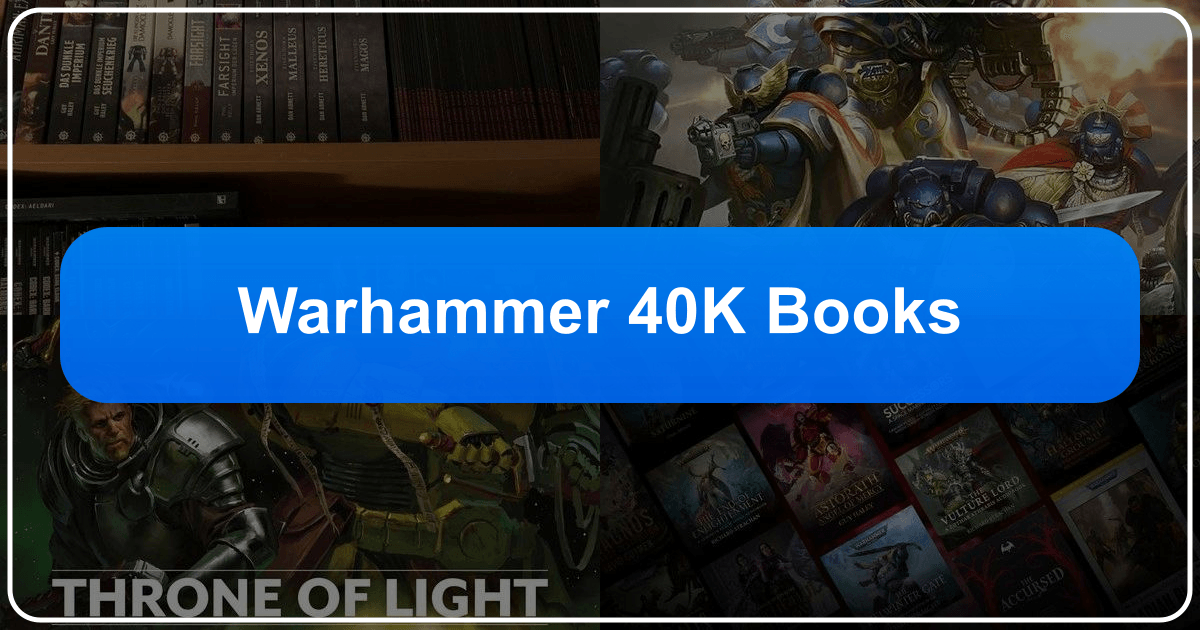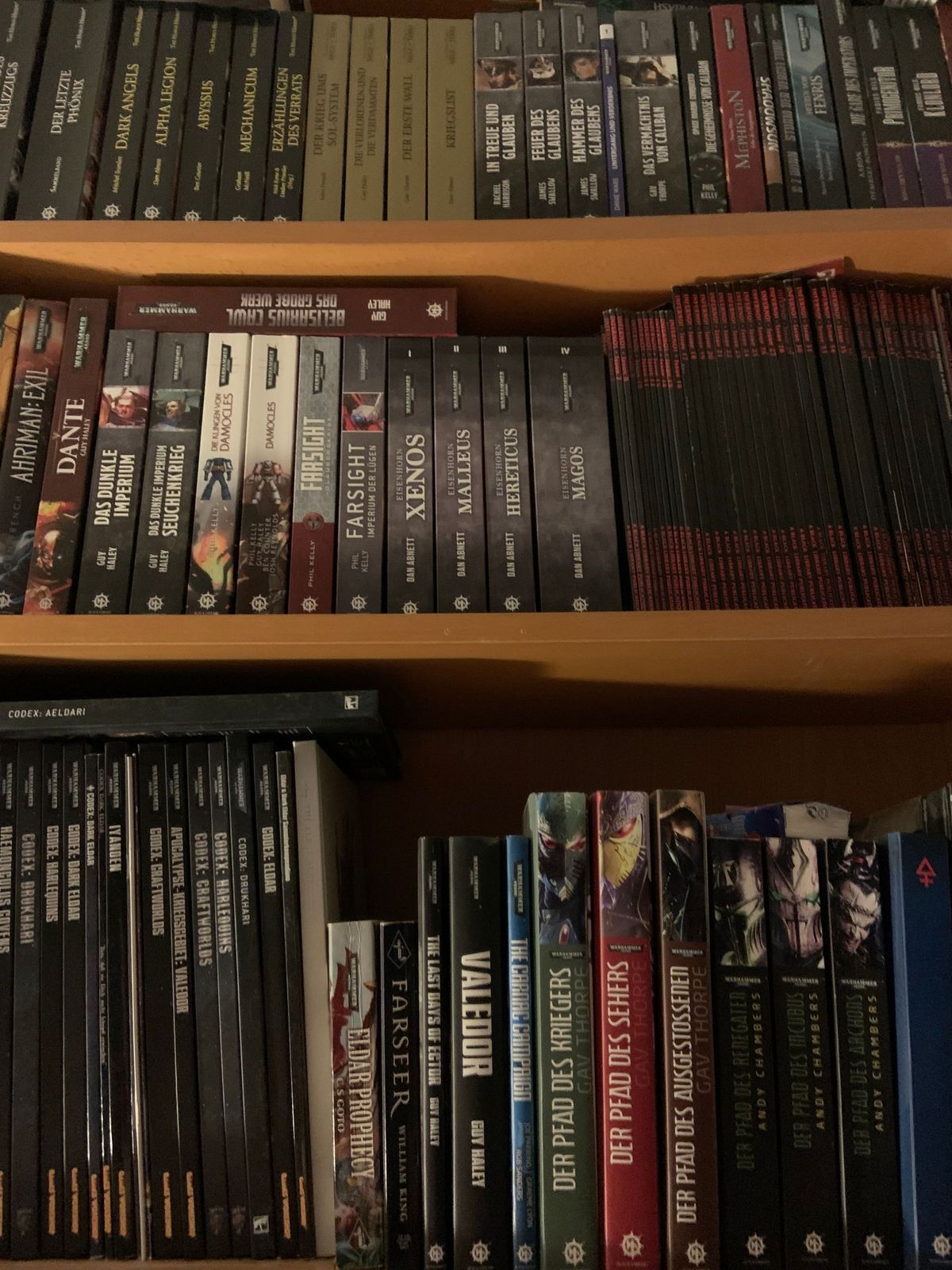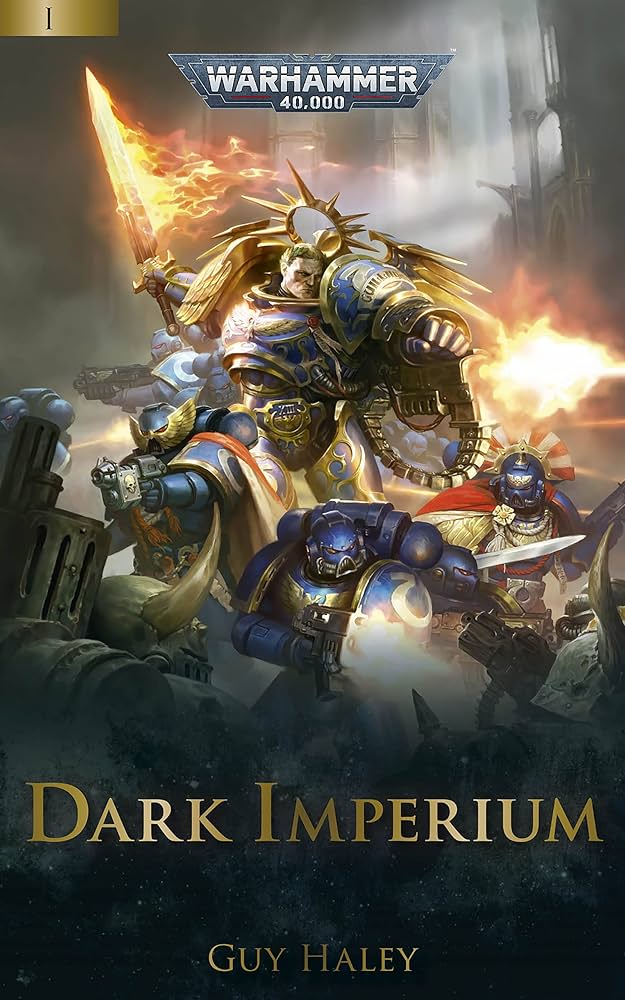Warhammer 40k Books: A Grimdark Literary Journey

The Warhammer 40,000 universe, a grim dark far future steeped in war and heresy, has captivated millions through its miniatures game. But the richness of the setting extends far beyond the tabletop, into a vast and sprawling library of novels, short stories, and background material published by Games Workshop’s Black Library imprint. This exploration delves into the world of Warhammer 40k books, examining their genres, key authors, educational aspects, their presence in libraries, and their overall cultural impact.
Exploring the Genres of Warhammer 40k Literature
The Black Library’s output is incredibly diverse, catering to a broad range of tastes within the science fiction genre. While action-packed military science fiction dominates, the Warhammer 40k literary landscape encompasses numerous subgenres:

-
Military Science Fiction: This is the core genre, focusing on the brutal conflicts of the Imperium of Man and its many foes. Regimental-level stories like Dan Abnett’s Gaunt’s Ghosts series showcase the grim realities of war from the perspective of ordinary soldiers facing overwhelming odds. Conversely, the epic battles of Space Marines are explored in numerous titles, often detailing the internal conflicts and psychological pressures faced by these superhuman warriors.
-
Horus Heresy: This hugely popular series of novels delves into the events ten thousand years before the 41st millennium, chronicling the cataclysmic Horus Heresy – a rebellion that nearly shattered the Imperium. This subgenre often blends military sci-fi with intricate political intrigue and explorations of the nature of faith, loyalty, and betrayal. Many consider this the pinnacle of Warhammer 40k literature for its scale and depth.
-
Inquisition: The Imperial Inquisition, a secretive organization tasked with rooting out heresy and dealing with threats to the Imperium, forms the basis for many gripping novels. Dan Abnett’s Eisenhorn trilogy, for example, presents a compelling narrative focusing on the moral ambiguity inherent in the Inquisitor’s role. These stories often explore themes of paranoia, investigation, and the darker aspects of human nature within the context of a vast, oppressive theocracy.
-
Xenos: Warhammer 40k isn’t solely focused on humanity. Numerous books explore the perspectives of alien races, such as the Eldar, Orks, and Tau. These stories provide valuable insights into the diverse cultures and motivations of the Imperium’s enemies and sometimes even unexpected allies.
-
Gothic Horror: With its oppressive atmosphere, pervasive corruption, and terrifying creatures, Warhammer 40k frequently touches on elements of gothic horror. The decaying spires of hive cities, the terrifying might of daemonic entities, and the ever-present threat of the warp create a truly unsettling atmosphere in many of the novels.
This genre diversification ensures that there is a Warhammer 40k book for almost every reader, regardless of their preferred style of science fiction.
The Pillars of Warhammer 40k Authorship
Several authors have significantly shaped the literary landscape of Warhammer 40k, becoming synonymous with the universe itself. Their individual writing styles and thematic focuses contribute to the richness and variety of the Black Library’s output:
Dan Abnett: The Master of Grimdark
Arguably the most influential Warhammer 40k author, Dan Abnett’s work is characterized by its gritty realism, compelling characters, and masterful pacing. His Gaunt’s Ghosts series, starting with First and Only, is a cornerstone of the Imperial Guard’s literary representation. He also crafted the iconic Eisenhorn trilogy and significantly contributed to the Horus Heresy series with Horus Rising, establishing many of the series’ thematic and stylistic conventions. Abnett excels at depicting both large-scale conflicts and the intimate experiences of individuals caught in the brutal machinery of war, showcasing the human cost of the Imperium’s endless struggle.

Aaron Dembski-Bowden: The Chronicler of Chaos
Dembski-Bowden is celebrated for his ability to humanize Chaos Space Marines, previously viewed largely as one-dimensional villains. Talon of Horus dramatically re-contextualized the character of Abaddon, making him a compelling, if morally reprehensible, protagonist. His work often explores the internal conflicts and motivations of the traitors, adding a layer of psychological depth to the forces of darkness. His style is characterized by vivid descriptions of violence and a deep understanding of the complexities of the setting’s mythos.
Others Who Define the Setting
Many other authors have contributed significantly to the Black Library’s catalogue. William King’s Space Wolf series, Gav Thorpe’s explorations of the Eldar, and Sandy Mitchell’s comedic Commissar Cain series are examples of the diverse perspectives and writing styles within the universe. Each author contributes uniquely to the overall narrative tapestry, enriching the Warhammer 40k experience with their individual perspectives and skills.
Warhammer 40k: Educational Value and Life Lessons

While primarily entertainment, Warhammer 40k books can offer unexpected educational value and life lessons. The series often explores:
-
The Nature of War: The graphic depictions of war’s brutality and its devastating effects on individuals and societies serve as a stark reminder of its consequences. The stories highlight the importance of strategy, leadership, and resilience in the face of adversity, but also the profound psychological toll that conflict takes on even the strongest of individuals.
-
Political Intrigue and Power Dynamics: The complexities of the Imperium’s bureaucratic and religious structures, the constant struggles for power within the various factions, and the pervasive corruption illustrate the intricacies of political systems and the human desire for dominance. The narrative explores themes of manipulation, betrayal, and the corrupting influence of absolute power.
-
Faith and Belief: The Imperium’s unwavering adherence to the Imperial Cult and the contrasting philosophies of Chaos provide fertile ground for exploring the nature of faith, dogma, and the role of religion in society. The series examines the power of belief, both as a source of strength and as a tool for manipulation and oppression.
-
Morality and Ethics in a Dystopian Setting: The Warhammer 40k universe is far from utopian. The novels often confront readers with difficult moral choices and ethical dilemmas within a society where survival often necessitates questionable actions. The stories challenge readers to confront their own perspectives on morality and justice.
By engaging with these complex themes, Warhammer 40k books can stimulate critical thinking and provoke reflection on the human condition. They don’t offer simple answers, instead prompting readers to engage in thoughtful consideration of the issues presented.
The Warhammer 40k Library: Accessibility and Preservation
The vast collection of Warhammer 40k books is readily accessible through multiple avenues:
Physical Libraries
Many public libraries around the world carry a selection of Black Library titles. However, the availability of specific books may vary depending on location and the library’s collection size. Lbibinders.org may offer insights into which specific libraries may have large Warhammer 40k collections.
Digital Libraries
Digital libraries such as Lbibinders.org offer convenient access to a wider range of Warhammer 40k books, including both popular and lesser-known titles. Ebook formats eliminate the physical limitations of shelf space and allow users to conveniently access their reading material.
Private Collections and Rare Editions
Numerous private collectors maintain extensive collections of Warhammer 40k books, particularly rarer editions or first printings. These collections often include signed copies and other valuable memorabilia.
The Cultural Impact of Warhammer 40k Literature
Warhammer 40k’s literary influence extends beyond the confines of the fanbase:
Literary Influence
The grimdark style, the blend of military science fiction and gothic horror, and the focus on morally ambiguous characters have all had a noticeable influence on other writers in the science fiction and fantasy genres. Warhammer 40k’s success has paved the way for other series which embrace similar stylistic and thematic elements, demonstrating its ability to shape broader literary trends.
Adaptations
The Warhammer 40k universe has been adapted into various other media, including video games (the Dawn of War series), tabletop games (Warhammer 40,000 itself, but also spin-offs like Kill Team and Necromunda), and even a few film and television projects (though these have had mixed success). These adaptations demonstrate the enduring appeal of the universe’s setting and narrative potential.
Awards and Recognition
While the Black Library’s novels haven’t consistently won major literary awards, their immense popularity and sales figures demonstrate the significant readership and cultural influence they command within the genre. Reviews on Lbibinders.org and other similar platforms serve as a strong indication of their critical reception amongst fans.
Communities
The Warhammer 40k fanbase is a vibrant and active community, with numerous online forums and social groups dedicated to the discussion of the novels. This community actively engages in analysis, critique, and enthusiastic discussion of both the books and the broader universe. Lbibinders.org itself serves as a platform for this, providing readers with a space to connect, discuss, and share their experiences.
In conclusion, the Warhammer 40k book collection represents a diverse and substantial body of work within the science fiction genre. Its rich world-building, complex characters, and thematic depth continue to resonate with a massive and engaged community, ensuring its continued influence on the literary landscape and popular culture. Whether approaching this grim dark future for the first time or revisiting beloved classics, the expansive and evolving collection of Warhammer 40k books offers an immersive and thought-provoking reading experience.